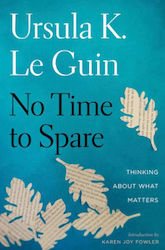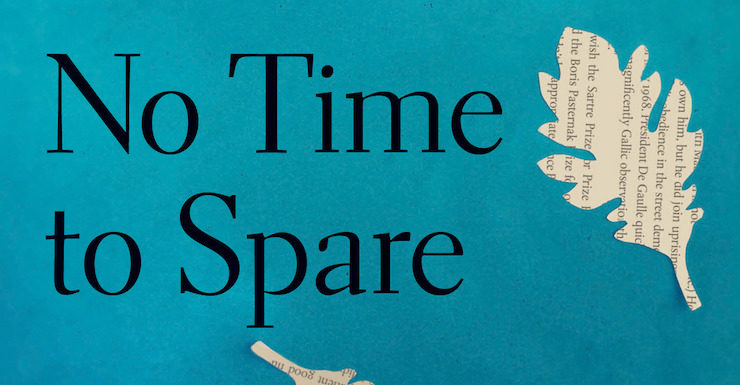No Time to Spare, a collection of nonfiction drawn from Ursula K. Le Guin’s blog, draws its title from a statement she made at the very beginning of her first full post: “I am going to be eighty-one next week. I have no time to spare.” Anyone looking at her career must wonder if she ever had spare time. After all, in addition to her science fiction and fantasy novels and collections, almost any one of her which could cap a lesser writer’s career, she’s published realistic fiction, a dozen volumes of poetry, several essay collections, a writing guide, and translations from both Portuguese and Chinese. I’m probably forgetting several things: the list of Le Guin’s publications that opens No Time to Spare, though it runs two pages, is far from complete.
Le Guin attributes her decision to start a blog to reading a selection of Portuguese Nobel winner José Saramago’s internet writing, though with, she avers, “less political and moral weight.” I do not know the Portuguese for “blog,” but perhaps it’s more euphonious than the English word, which Le Guin hates: “it sounds like a sodden tree trunk in a bog, or maybe an obstruction in the nasal passage.” In any case, the form suits her. Le Guin is, in fact, a better political thinker than the great Saramago, and even the essays she worries are most “trivially personal” are so animated and so entertaining that no reader can skip them.
Buy the Book


No Time to Spare: Thinking About What Matters
Although most of the essays in No Time to Spare are occasional—written after a visit to an opera, or on receiving letter from her alma mater, or on the death of a friend—very few of them are topical. A news item might inspire a post, but the specific prompt, whatever it might be, often proves less important than the general reflections it inspires. No Time to Spare’s subtitle, “Thinking About What Matters,” is an appropriate one.
Le Guin, in short, is a good essayist who would make a terrible internet controversialist. She values uncertainty, accepts disagreement—even disagreement with herself—and has never, to my knowledge, written a hot take. Even her essay on anger, one of the best in the book and certainly the most political, ends in honest perplexity. She values the open-ended question more than the pithy summary and prefers the open conversation to the closed lecture.
Highlights of No Time to Spare include the author’s account of youthful meetings with a friend’s uncle, John Steinbeck (“Once I sat hidden with him and Jean under a huge bush at a huge wedding in Cleveland, Ohio, and drank champagne. Jean or I foraged forth for a new bottle now and then. It was Uncle John’s idea.”), a wide-ranging essay on Homer and fantasy, and a recital of the joys and pains of answering children’s fan mail. Not every essay comes off: one in particular, on the semantics of “belief,” struck me as tendentiously unconvincing, but every one is worth reading.
Lest I give the impression that No Time to Spare concerns itself exclusively with literary matters, I should note that around thirty pages are devoted to one of the internet’s most popular subjects: cats. Pard, latest in a long and distinguished line of cats, inspires several of the most memorable essays. It’s easy to imagine that, had she taken a slightly different path, we might know Ursula Le Guin as one of our best nature writers:
He is pretty, but his only unusual beauty is his eyes, and you have to look closely to realize it. Right around the large dark pupil they are green, and around that reddish yellow. I had seen that magical change in a semiprecious stone: he has eyes of chrysoberyl.
Much as I prefer reading a printed book to reading off a screen, there are some pleasures of the blog form No Time to Spare just cannot recreate, like the cat videos Le Guin occasionally posts. Still, I think on balance the printed page is better than the screen here: Le Guin deserves scrutiny, not skimming, and it’s a pleasure to read her work without the all the various distractions a computer offers. Le Guin continues to blog, and there are many fine posts that did not make it between these covers. I, for one, am hoping for a companion volume, and soon.
Early on, Le Guin writes of the advantages of old age, too often discounted by the young. For “old people” who have devoted their life to their occupation, ”practice does make perfect. They know how, they know it all, and beauty flows effortlessly from what they do.” No Time to Spare is itself proof of that statement.
No Time to Spare is available from Houghton Mifflin Harcourt.
Matt Keeley reads too much and watches too many movies; he is helped in the former by his day job in the publishing industry. You can find him on Twitter at @mattkeeley.










